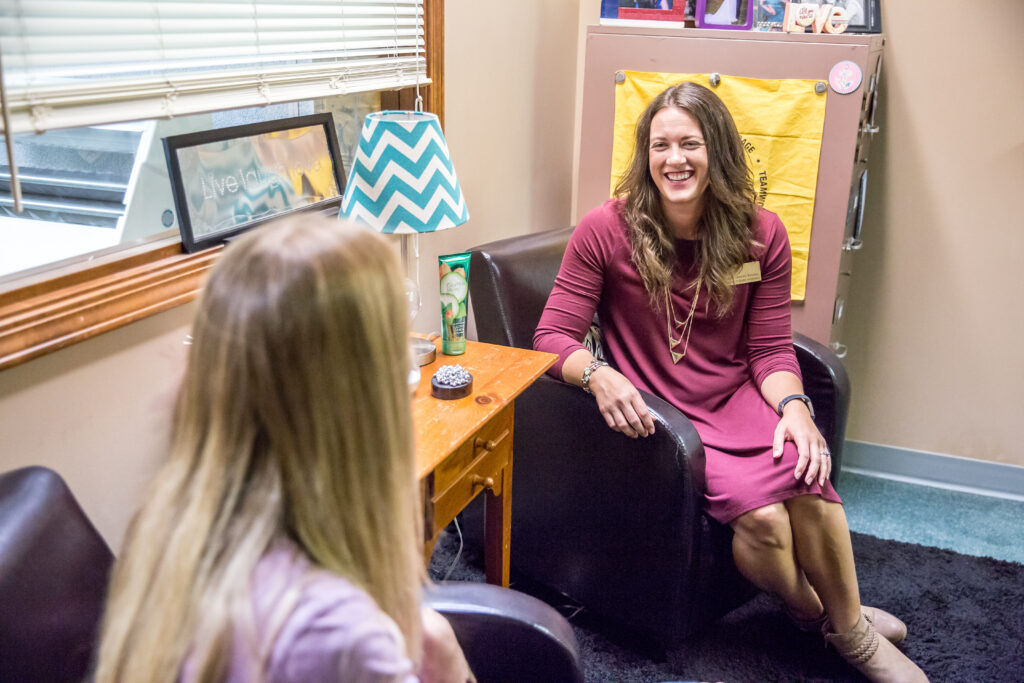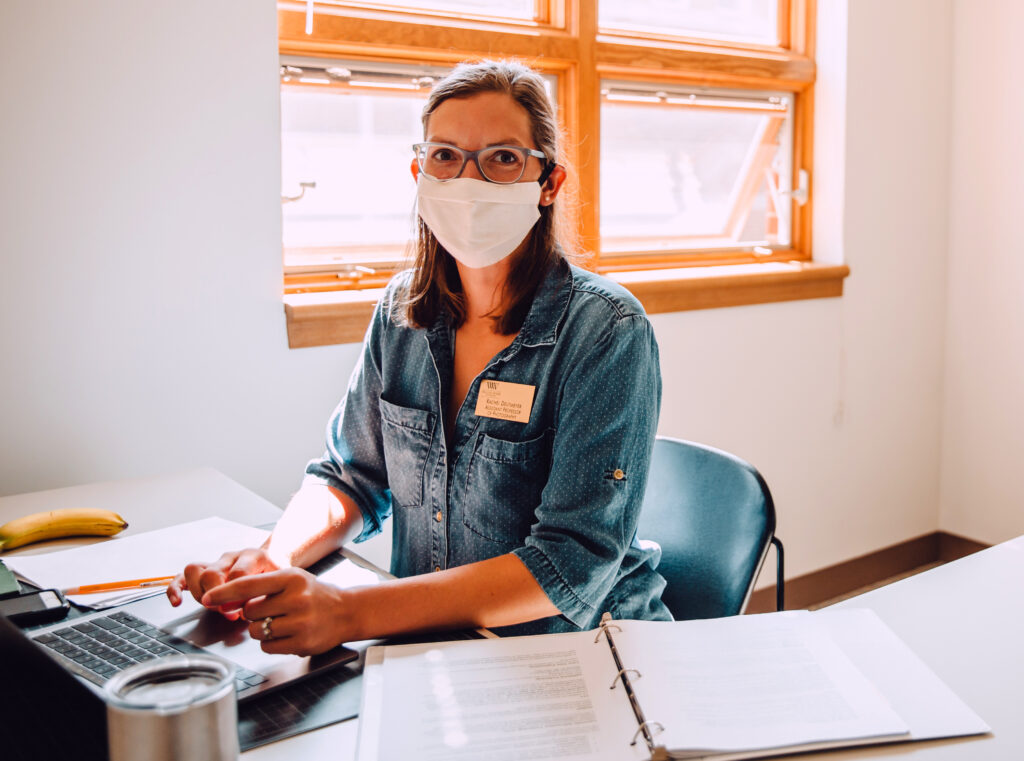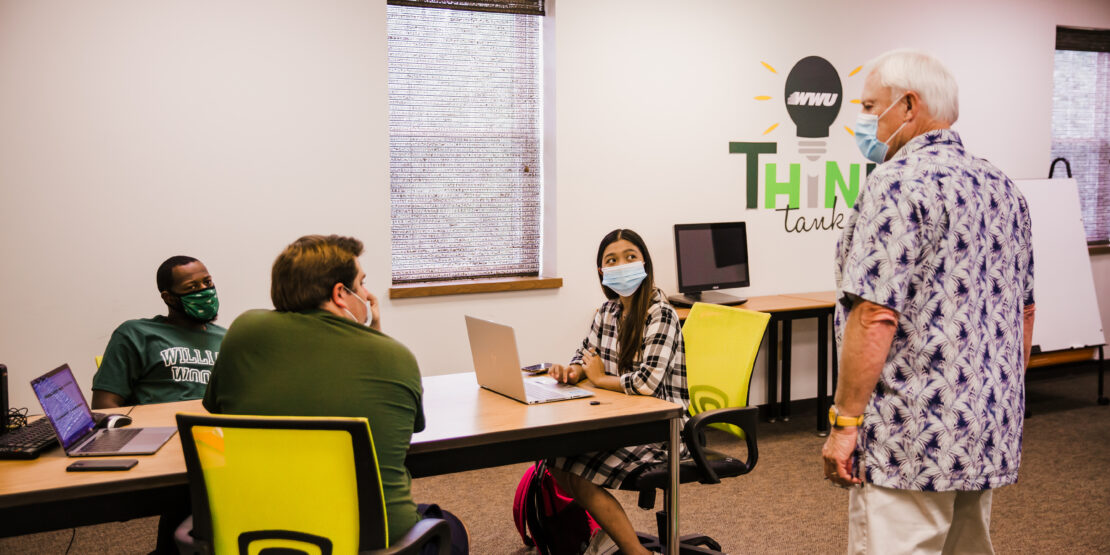Zero active COVID-19 cases.
For the better part of the past week, William Woods University has found itself in rarified air when it comes to the number of active positive cases of the virus on its campus. While other colleges and universities around the state and nation have continued to fight varying degrees of active positive cases, WWU has been that rare institution that has maintained a perfect scorecard for days – as in zero students or staff currently with the virus.
While that was the goal the campus set or itself for the fall semester, attaining it was going to take a concerted effort involving the entire campus community. And that is what has been happening. A Care Corps team consisting of Student Life, Athletics, faculty and staff have been working around the clock to ensure all students are provided a safe learning and living environment on campus this fall. This has included members of the Care Corps team facilitating contact tracing and food service to help students in quarantine and isolation.
Contact Tracing
Student Life members have been working with the Callaway County Health Department to assist with contact tracing. Lacey Sweeten Randall, Director of Student Involvement and other staff members have been doing training with Callaway County to help them perform all contact tracing for students including close contacts on and off campus.

Once a positive test is received, the Student Life Office is informed and Sweeten Randall is tasked with contact tracing with the students and informing them of the next steps. The student is provided with accommodations related to food and a living situation. Students who live locally have an option to drive home and are provided directions on how to be safe once they get there. Once they figure out the living situation, they must log their symptoms for ten days and only released when they demonstrate that they are improving to a healthy state. The campus follows the Center of Disease Control Guidelines, which defines a close contact as “someone within six feet for more than 15 minutes starting from two days before illness onset or for asymptomatic clients, two days prior to positive specimen collection until the time the patient is isolated.”
“We have been successful because the cases that I have worked on campus had very few contacts, as in five or less people,” Sweeten Randall said. “This keeps COVID-19 from spreading and is a lot more manageable for our staff to handle with meals and all those things,” she said.
One advantage Sweeten Randall and the Student Life staff have had was already going through COVID-19 cases in March, extra experience has helped the campus minimize the spread of COVID-19 this fall.
“I felt super happy that we got to 0 active cases,” Sweeten Randall said. “You look at the news to see what’s happening and cases around the country are rising. I give credit to students, who are doing what they need to do to keep that number down.”
Following up with student-athletes
The Athletic Training staff is also assisting campus nurse practitioner Kristen Oesch by following up with any athletes that are in quarantine. Head Athletics Trainer Mike McElhinney knows if the student that tested positive or is deemed a close contact is an athlete it will become his responsibility to follow up and release them from isolation, if their test is positive. He will also help to contact trace and identify individuals that need to be in quarantine.
McElhinney benefitted from a contract tracing course available on line for free, taught by another reputable higher education, and encouraged his assistant athletics trainers to take the course as well.
“The saying it takes a village to raise a kid,” McElhinney said. “The same can be applied to keep the school going in the direction we are going. Our COVID response team and the Care Corps are like the village and the school is the kid. We all have to work together and be in constant communication to keep the boat afloat and going in the right direction. It has been amazing seeing all of the different areas of campus coming together to try and make this return to learn in person work,” he said.
Food service
Tracy Gastineau, head softball coach and Associate Athletic Director, has been going by the nickname “Food Czar.” She earned the new name, bestowed on her by Dean of Student Life Dr. Venita Mitchell and Athletic Director Jason Vittone, because she has overseen all the coordination of the delivery of the food to students in isolation. Gastineau says the athletic department was tasked with food delivery so that any student that is in isolation receives their meals in a timely fashion. To assist with food delivery efforts, Gastineau created seven different teams consisting of graduate assistants, coaches, and staff, with each assigned a day to deliver food.
“WWU is a place where you are considered a name and not a number,” Gastineau said. “It is student centered and these are examples of what our university has done to take care of that. That is something that is always going to be a part of our plan. It is important that all are cared for and taken care of.”
Volunteering for the Care Corps teams
Students in quarantine or isolation are provided a faculty or staff member who volunteers on the Care Corps team as their point of contact. One of the members is Associate Professor of Business and Economics David Forster, who lives in Fulton, and thus had a convenient way of time helping out.
“We are a small school and we know our students,” Forster said. “They are more to us than a number in a classroom. They are friends, more like family. It is important that faculty and staff are ready to help. You don’t turn your back on friends and family when they need help.”
Another member, Assistant Professor of Photography Rachel Deutmeyer, volunteered for Care Corps to support the well-being of the university community. She had worked with one student, establishing communication through casual conversation and sharing text messages, counting down the days in quarantine and celebrating the day the student was cleared. Deutmeyer would often check in on the student’s activities, coursework, and social aspects of life in quarantine.

“I enjoyed getting to know more about the student, sharing campus resources, and trying to brighten each day,” Deutmeyer said. “I care for WWU students and want to communicate that though they may be in quarantine, they are not forgotten. In the era of COVID-19 and social distancing, it seems even more important to be intentional in our communication and care for others.”
Assistant Registrar Colette Whelan volunteered because she wanted to help these students and knew it can be a challenging time for them. She mainly has gotten groceries and answered questions for students. She thinks it is important to have this team so that the students have one person they know they can count on and to get answers from. If she does not know the answer to their questions, she will help them to find the information.
“I thought if my daughter was in the same situation, I would want her to have someone to answer her questions and help with anything she might need,” Whelan said. “It is also helpful for their families to know that someone is looking out for them, that they aren’t just quarantined and left to figure out things on their own.”
Campus officials advise people to follow the guidelines including hand washing, using hand sanitizer, and wearing a face covering. The more campus abides by rules and guidelines, the greater the chance that in-person classes on campus can continue throughout the entire academic year. But when positive cases of COVID inevitably return, The Woods will be ready to address the needs of those infected individuals through the dedicated and committed teamwork of the campuses’ faculty, staff, and students.

